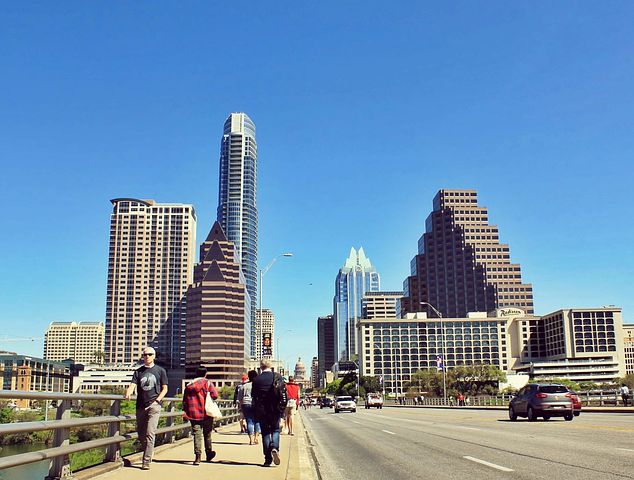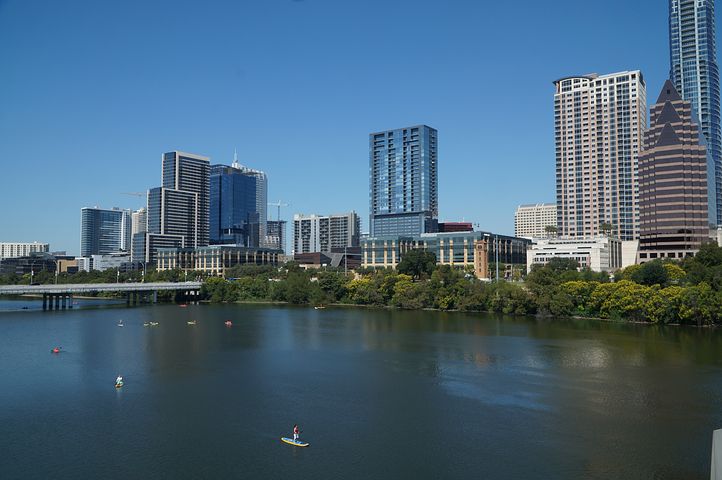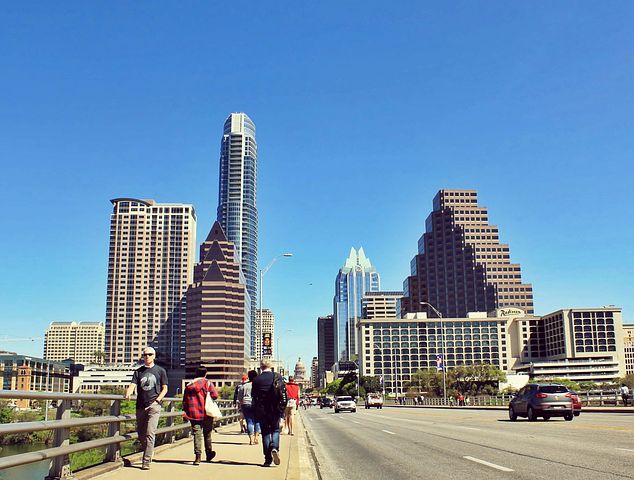For several years now, we have been witnessing a true exodus of Californians to Texas. In Austin, the second Silicon Valley, tech giants such as Google, SpaceX, Oracle, and Hewlett-Packard have opened their offices. The “Lone Star State” attracts Americans with its business opportunities, affordable housing, and a quality of life that, according to statistics, ranks among the highest in the United States.
Texas is huge, larger than any European country (except Russia), and has only 30 million residents. The state is also culturally diverse, with strong Vietnamese and Chinese communities, over half of the population being Latino, and a growing number of citizens from other countries. However, the most interesting phenomenon at the moment is the mass migration of people from other US states, particularly California, to Texas.
I first encountered this phenomenon while traveling on local Texas roads in Hill Country. My friend, 82-year-old Eleonora Goodley Dlugosh, made me realize that most of the drivers stuck in a massive traffic jam on the highway leading to San Antonio were Californians. There are already hundreds of thousands of them, and more keep coming, which is creating various tensions among the locals. If you go to Texas and drive with a local, sooner or later you’ll hear a comment like, “How do these Californians drive? Another one cut me off. If so many of them weren’t moving here, there wouldn’t be such traffic.” The situation on the roads is not the only cause of frustration among the people of the “Lone Star State.” In just a few years, hundreds of thousands of people from California have arrived in Texas, which has led to rising property prices. This is true not only for large cities and modern technology hubs like Austin, but also for rural areas, where more and more people from the West Coast are searching for a place to call home.
Cultural Differences
California and Texas have a lot in common. Both states are culturally very close to Mexico — this applies to their broad culture, food, music, and art. During the Gold Rush in the 19th century and later through the decades of the 20th century, hundreds of thousands of people traveled the famous Route 66 to California in search of a better life. To this day, new Americans settle there every year. Meanwhile, Texas, since the early 20th century, has attracted people with its oil industry — alongside Saudi Arabia, it is a global center for oil extraction. Both states also have strong traditions of ranch-style living.

Despite many similarities, due to the migration of Californians, voices are emerging in the media and on the streets about problems with identity—its loss and dilution. There are differences between the newcomers and the locals—on one hand, small mental nuances, and on the other, fundamental life choices, mainly worldview-related. California is a stronghold of the Democrats, while Texas is a fortress of the Republicans. Texas Governor Greg Abbott, a Republican, has publicly warned in response to the mass migration of Californians and the state’s booming economy that immediate action should be taken to ensure that the “Texas miracle” does not become the “California nightmare.” This concern was not just about the high cost of living caused by economic success. It was a fear of an influx of liberal, Democrat-supporting Californians. However, these concerns may be excessive. The US is a democratic country, and a few hundred thousand newcomers from California out of 30 million people is just a tiny fraction. Furthermore, not all of the newcomers, even from other states, are likely to support the Democrats or even want to vote. However, from a social standpoint, the hundreds of thousands of new residents who support the Democrats represent a change that Texas Republicans do not seem prepared for.
Once, while walking through the streets of a small Texas town, I approached the window of a local restaurant. In front of the entrance, the owners had placed a sign. It read: “We do not serve low-fat yogurt. This is not California. This is Texas!” This humorous slogan encapsulates the small but significant differences in terms of identity. It’s a joke, yet it reflects frustration. Whatever the authors of the slogan were thinking, they managed to express many concerns shared by Texans in that one sentence. For the same reason, bumper stickers, t-shirts, and hats with the recurring slogan “Don’t California my Texas” are visible all over the state.
Business is Business
When you Google the phrase “Why should you move to Texas?”, the top results are articles explaining this phenomenon. Many of them come from moving companies’ blogs. There are also rankings, such as “The Ten Best Companies to Help You Move from California to Texas.” The business is growing rapidly. No surprise—it’s tens of thousands of people every year who need to be packed up and transported to Texas. So what’s driving this exodus? Money! Liberal, Democrat-supporting Californians have moved to the once considered provincial and Republican Texas for financial opportunities. The enormous demand for IT specialists and workers in other sectors of the economy means that large corporations are reaching out for personnel from around the world. In my book Texas is a State of Mind, I describe one of my flights to Houston, where I met a Kazakhstani citizen who had been living in Texas for two years. He moved there at the invitation of a large corporation that needed IT specialists. On the plane, in the area where meals are prepared, a Muslim Texan citizen, traveling from Turkey after visiting family, was praying on a prayer rug.

The economy is flourishing, despite the disruptions caused by the pandemic and the brief period in 2020 when the extractive industry faced a setback due to oil prices. At that time, producers were forced to pay buyers to take and store the goods. There was too much supply due to the sudden halt in demand. For the first time in history, instead of paying for oil, producers were paying buyers to take it from storage.
The Second Silicon Valley
Austin, often referred to as the second Silicon Valley, is said to be a modern, cosmopolitan city that has little in common with the rest of the state. This is true—if you see a man on the street in cowboy boots and a hat, people will point and say he’s from the province. Elsewhere in Texas, it’s a natural sight. In Austin, corporations reign, skyscrapers dominate, and the big city atmosphere prevails. It’s a place for young people and companies in the tech sector. More and more people are settling there in hopes of improving their living conditions.
Large companies are moving to Texas or opening their headquarters there, followed by their shareholders, owners, and employees. One of the most famous recent relocations, commented on in the media, was Elon Musk’s change of residence. He didn’t just move to Texas due to Tesla’s new investment but also to oversee his space business, SpaceX, which has a branch in Texas. Many other companies in the space industry, including Jeff Bezos’s Blue Origin, have opened branches in the state. Recently, Drew Houston, the CEO of Dropbox, also became a Texas resident, moving permanently to Austin. Venture capital funds are constantly interested in Texas, particularly its capital, and are setting up their headquarters there. The growing economy and many highly educated people starting businesses in the internet industry present a real El Dorado for them. At the end of 2020, Oracle and Hewlett-Packard announced they were moving their headquarters to Texas. The new Silicon Valley has attracted tech companies such as Google, Facebook, and Apple. At the same time, hundreds of less globally recognized companies are also relocating to Texas.

Why is Texas so attractive?
Low taxes, the absence of a state income tax, and no corporate taxes have led to an influx of Americans from all over the country, drawn by job offers and marketing efforts by city authorities. Statistics rank Texas, as well as the cities of Austin and Houston, as top places to live in the U.S. due to the cost of living, taxes, and ease of doing business. The massive population growth is making developers rub their hands together, restaurants are opening, shopping centers are being built, and the city is developing rapidly, all while facing the inevitable consequences—traffic jams, pollution, and other issues associated with rapidly growing metropolitan areas. After Californians, the largest group moving to Austin comes from New York and Florida. The lack of a state income tax means that Californians, who were barely getting by while renting, can now think about purchasing their own homes after relocating to Texas. Over the past decade, the city has grown by half a million residents, an increase of one-third, and property prices have risen by 84%. Therefore, Texas, particularly Austin, does not have the cheapest properties, although prices are still lower than on the West Coast.
The legendary independence of Texas
Texas is the only state in the U.S. with an independent electrical grid separate from the federal network. This is important for a state that requires vast amounts of energy to extract gas and oil. Criticized by many Americans, Texans faced a wave of backlash after the sudden cold snap that hit Texas in 2021. For several days, power outages occurred in many parts of the Lone Star State. External media blamed not only the weather conditions and frozen installations but also suggested that this was the result of Texas’ legendary independence and its independent power grid. What about electricity prices? Having its own grid means lower electricity prices, so electricity costs in Texas are much lower than in California. This is another logical argument for packing up the family and moving to this state. However, it’s important to sign a smart contract that guarantees fixed electricity prices. During the cold snap, variable rate charges skyrocketed to several thousand dollars per day. Some people will be paying for those few days for years.
It seems that Texas is on the path to long-term growth, and nothing will be able to stop this process. The growing economy and wages, and consequently, the inevitable increase in the cost of living, will eventually narrow the gap between Texas and California. Then Americans will move on to the next state that begins to lead the race. After all, it is no coincidence that Americans are said to be the most mobile nation in the world.

